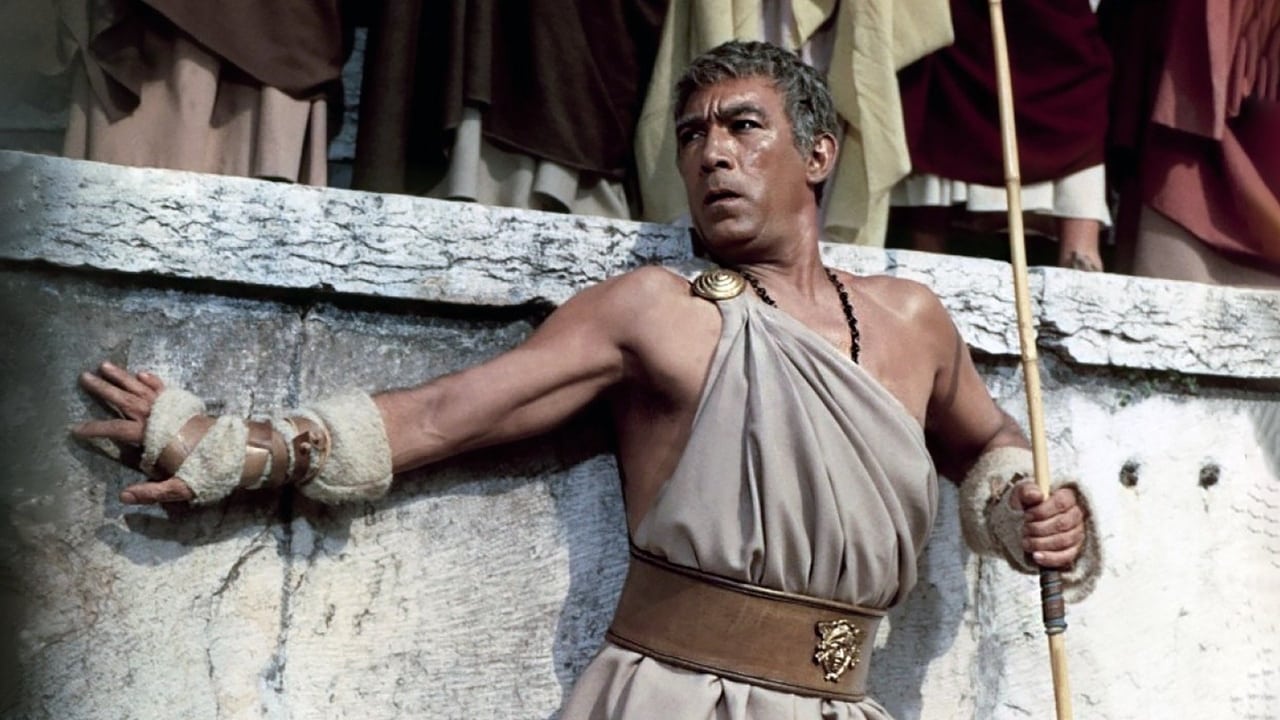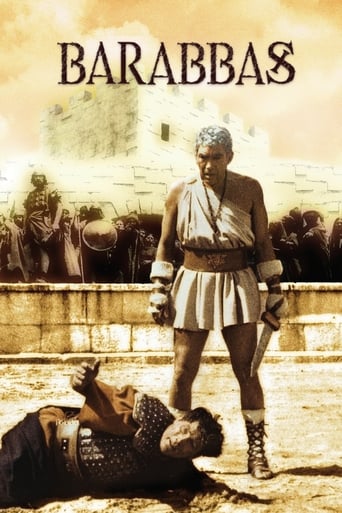



disgusting, overrated, pointless
Awesome Movie
A lot of fun.
Instead, you get a movie that's enjoyable enough, but leaves you feeling like it could have been much, much more.
View MorePontius Pilate releases the violent criminal Barabbas (Anthony Quinn) instead of Jesus. Barabbas returns to his drunken friends to find his lover Rachel (Silvana Mangano) has become one of Jesus' follower. He goes blind for awhile as Jesus is crucified. Rachel gets stoned to death for blasphemy. Barabbas is arrested again for robbing a temple caravan but Pilate tells him that he is not allowed to sentence him to death again. Instead he is sentenced to the sulfur mines in Sicily. He is chained to a Christian Sahak but he still refuses to believe in Christ. After many years, they are brought to Rome and become gladiators under the famous champion Torvald (Jack Palance).Nobody can claim that the film went cheap on the production. This is a big scale movie of Old Hollywood. The acting is very broad at times. I really didn't like the constant referencing to Jesus in the first half. It becomes too much when he meets Lazarus and the Disciples. Rachel and Sahak are much better conduits for the message. I do like the sulfur mines as a substitute for hell. I would have liked him to find salvation down in the mines. It would be poetic and make the movie shorter.
View MoreWhile at first you could possibly be forgiven for thinking Barabbas might look like a cheap Italian epic, it is far, far from being so. The person I saw it with described it as a sword a sandal epic with some religion thrown in to cash in on the genre. If you also thought so, then maybe you need to look again. This has to be one of the most literate screenplays given to a 'Biblical' (yet non-Biblical epic). Bristol born Sceenwriter Christopher Fry, regarded by many as the Shakespeare of the 20th Century, has crafted a perceptive adaptation of Swedish Nobel Prize winner Par Lagerkvists' novel of the same name. The film wreaks of stunning atmosphere. Striking images created by award nominated Cinematographer Aldo Tonti conjure up the best art of the dark age masters. Pay special attention to the Crucifiction scenes, these were filmed during an actual eclipse of the Sun, as it occurred on 15th Feb 1961! The production design by Mario Chiari was also award nominated, and deservedly so, leaving you gasping for air amid astoundingly realistic sets. The National Board of Review awarded Barabbas the Best Foreign Film of it's year.Mario Nascimbene caps the eerie moods with an innovative haunting music score. While the action scenes are violent in their recreation, they serve to force us to realize the shocking inhumanity of the Roman Arena, a severe denouncement of the repugnant, decay riddled Roman Empire. Anthony Quinn, Vitorio Gassman, Harry Andrews, Silvana Mangano, Ernest Borgnine, et-all, give convincing performances that should sweep the discerning viewer along a tour de force journey. Jack Palance is truly menacing in a larger than life performance as the arena's maniacal killer. While it's mostly impossible to fully translate a novel into a screen play, it seems Fry has worked hard to keep much of the poetic prose of Lagerkvists' 50's original intact.American Director Richard Fleischer (son of famous animator Max) demonstrates full command of this difficult project and infuses it with the same intensity he imparted to several of his other gripping works: Compulsion '59 ~ 10 Rillington Place '71 ~ The New Centurians '72 and Edward G. Robinson's impressive 'swan song' Soylent Green in '73. If you can patiently follow as a tortured soul journeys into self discovery, then you should be rewarded by the experience of Barabbas. Recommended for the viewer who can 'read' a film like a book. It seems Columbia have recently re-mastered this film on DVD, I look forward to seeing it.
View MoreOf all the epics made during the 50s and 60s, this is one of the most memorable and certainly the most unusual - it hasn't dated all that much mainly because of its almost surreal quality.The film is based on Pär Lagerkvist novella, which tells the story of Barabbas, the bandit the people of Jerusalem chose to save instead of Jesus Christ. It is a haunting work; a chronicle of survivor guilt as Barabbas comes to terms with why he was spared.The screenplay by Christopher Fry, the playwright regarded by contemporaries as the 'Shakespeare of his time', follows the novel to a point: the crucifixion of Jesus, Barabbas meeting with the disciples in Jerusalem, his time in the mines; and finally, his anguished days in Rome.However, the filmmakers added other elements, especially the brilliant scenes in the arena and the gladiatorial sequences. The film also changes some of the characters. The emaciated woman referred to only as 'the girl with the hare-lip' in the novel, whose fate so troubles Barabbas, becomes the beautiful Rachel played by Silvana Mangano, but her end is the same; stoned to death for her beliefs.Despite the changes, the film captures the strangeness of the novel and adds a surreal touch that even Fellini would have approved of. In fact, it was Fellini who first thought of making the film, and felt that Anthony Quinn would be right for the part. However this is director Richard Fleischer's film. He made some good ones including "The Vikings", but this film is far removed from others such as "Ashanti". "Barabbas" is his masterpiece. Somewhere along the way he tapped his inner Fellini.Many factors give the film its power. Anthony Quinn is hardly off the screen and brings his unique intensity to the role; you feel his torment as he believes his death has been stolen. Harry Andrews makes a thoughtful Peter, Arthur Kennedy likewise an erudite Pontius Pilot, but Jack Palance just about steals the film as the psychotic gladiator, Torvald.One of the most powerful aspects of the film is the music. This was the era of impressive epics with monumental scores to match - Tiomkin's "Land of the Pharaohs", Rozsa's "Ben Hur", North's "Spartacus"; all brilliant, all employing massive orchestras. However Mario Nascimbene's score is different. He was experimental and combined orchestral instruments with sounds created electronically, gongs recorded at half speed etc; standard stuff these days but right off the wall in 1961. Anyway, the score he created still sounds avant-garde - just listen to it during the whipping of Christ or accompanying the scenes in the mines. This was also Mario's masterpiece, because a lot of his other scores sound pretty ordinary in comparison.The art direction and costumes were also off-centre for this kind of movie. The Romans with their plumed helmets and furled cloaks smack of paintings of the Neo-Classical or Romantic periods of art rather than the functional realism of "Spartacus" or "Fall of the Roman Empire".All those talents combined to make this the most haunting of epics; it has another quality above spectacular sets and scenes. It's a film that is hard to forget.
View MoreI, of all people, know that it is unfair to compare a movie to a book. Since this film was viewed as an extension of a book study, it's hard not to do so. So I will try to be fair. I believe that Par Lagerqvist's work has an overwhelming existentialist vent to it. Barrabas witnesses the Crucifixion. He can do this because he has been spared his life due to the fact that once a year, a prisoner can be pardoned. Of course, the people call for him and reject Christ. All this follows the plot and Barabbas find himself back in his old ways. He is a subversive, but really all about himself. The book was written in 1951 by a man who had rejected Christianity. The problem with the movie is that it sucks so much humanity out of its main character. The subtle moments that show he is on a course of self discovery, don't, for me, match the book's character. I also found the whole gladiator thing, which never appears in the book, to be strictly fodder for the lowest common denominator. It is probably because this was competing with the other Biblical epics of that time. I will give Jack Palance credit. He is about as mean spirited as anyone ever in film, a true psychotic presence with his almost maniacal grin. I think at that point the subtleties went out the window. It's not a terrible movie (it's quite decent in its own way), but I think with a director and some writers that could have embraced the novel a bit more (and kept the original characters as they are described) and not bowed to popular culture, it would have been much better.
View More